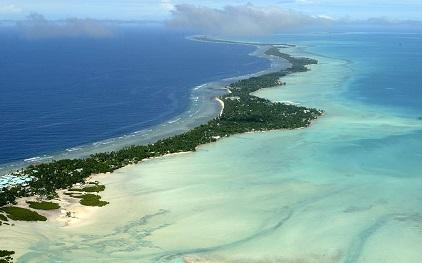
Kiribati, made up of low-lying atolls, is one of the most climate-vulnerable nations in the world
By Jonathan Fowler
CANCUN, Mexico, 22 May 2017 – For island nations on the frontline of climate change and a swathe of natural hazards, the issue of whether communities should give up the battle and leave is never far away.
Meeting on the eve of the 2017 Global Platform for Disaster Risk Reduction in Cancun, Mexico, representatives of the world’s Small Island Developing States (SIDS) have come together to exchange lessons and spotlight the challenges that they face.
The 57-strong SIDS grouping has members in all of the planet’s oceans, mostly clustered in the Caribbean and the Pacific. In the latter, many of the countries are made up of low-lying atolls, where rising sea-levels and increasingly frequent and intense storms are testing the resilience of communities.
“Even a small hurricane can destroy all of our coastal areas,” said Ms. Lani Milne, Chief of Coastal, Land and Conservation at the Republic of the Marshall Islands’ Environmental Protection Authority.
Particularly symbolic of the problem is Kiribati. It is made up of 33 small islands scattered across the ocean, with more than half its population crowded onto just one, the capital, South Tarawa. Many of its atolls rise just two metres above sea level.
“We’re one of the countries that’s most vulnerable to climate change,” said Ms. Mimitong Kirata, a Kiribati government risk management expert, who detailed defence measures including building new seawalls and planting mangroves.
Kiribati’s former president, Mr. Anote Tong, was a vocal advocate on the international stage during his three terms in office from 2003 to 2016, taking the stage at events such as the Third UN World Conference on Disaster Risk Reduction and the Paris climate conference, both in 2015.
Already at the 2009 Global Platform for Disaster Risk Reduction, he implored the international community to take effective action against climate change before it became too late for Kiribati and other Pacific SIDS. And five years ago, his government decided to buy land in Fiji as a form of insurance against climate change, in case people needed to move to survive.
Population movement is a fiercely complex issue, and not just because of shifting global debates about migration. Internal migration can bring its own problems, due to a lack of capacity in other parts of a country, and also raises the prospect of unplanned urbanization that can make communities more vulnerable to a range of risks.